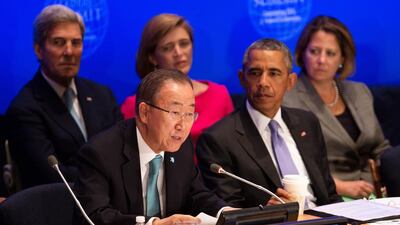In a rare appearance before assembled journalists for Saudi Arabia’s young defence minister, Prince Mohammed bin Salman made a surprise announcement. The kingdom, he said, would form a 34-state military coalition of Islamic countries to combat terrorism, headquartered in Riyadh.
ISIL, of course, would be top of the hit list. That is a welcome move. We have often argued that ISIL is a borderless enemy and must be fought Syria and Iraq. As the Saudi minister pointed out, it is primarily the Islamic world that has been damaged by the “disease” of extremism, even though allies in the West have also been attacked.
In the Middle East alone, four states are currently destabilised (Syria, Iraq, Yemen and Libya) and it is vital that those states are put back together. Defeating extremists in those countries is the first and most vital step – and it is not one that can be accomplished by one country alone.
ISIL has been cunning, exploiting divisions in the crowded and complex societies of Syria and Iraq. It has reasoned, not always incorrectly, that the competing ambitions of various Syrian fighter factions, Iraqi communities, as well as countries like Turkey, would enable it to carve out and defend an area.
That is to say nothing of the ideology, which has festered in the area ISIL controls, but has also been exported around the world. Few seem immune to it: Europeans and Arabs, Africans and Americans have all succumbed. That makes it even more essential that the alliance goes after this disease wherever it is found.
For now, the enemy is obvious, and members of the coalition can easily agree on their goals. Further down the line, the coalition will need a clearer definition of what terrorism means to them.
In his press conference, Prince Salman gave a long list of other places affected by terrorism: Sinai, Yemen, Libya, Mali, Nigeria, Pakistan and Afghanistan, suggesting that the coalition may set its sights on providing assistance and coordination, or even getting involved, in all those countries. That will require clear rules of engagement, to keep the coalition together.
The military alliance is a positive step and much needed – fighting extremism will be a long road and will require many partners.

